This is a post from Maya’s eyes about her summer abroad program in China with The Experiment in International Living. Here, she talks about her thoughtfully orchestrated integration into Chinese culture and the lessons it taught her about her own. Thank you, Maya, for giving us a window into this wonderful experience!
This summer, when traveling to China with The Experiment in International Living, I was given the opportunity to integrate into Chinese culture. Despite my American upbringing, there came a point in the trip when I found myself feeling much more Chinese than Californian! Not only that, but my travels provided me with the opportunity to take a step back and reflect upon the American values and customs that used to seem so familiar. Thanks to The Experiment, I gained the confidence and know-how to integrate into the Chinese culture and reflect back on it.
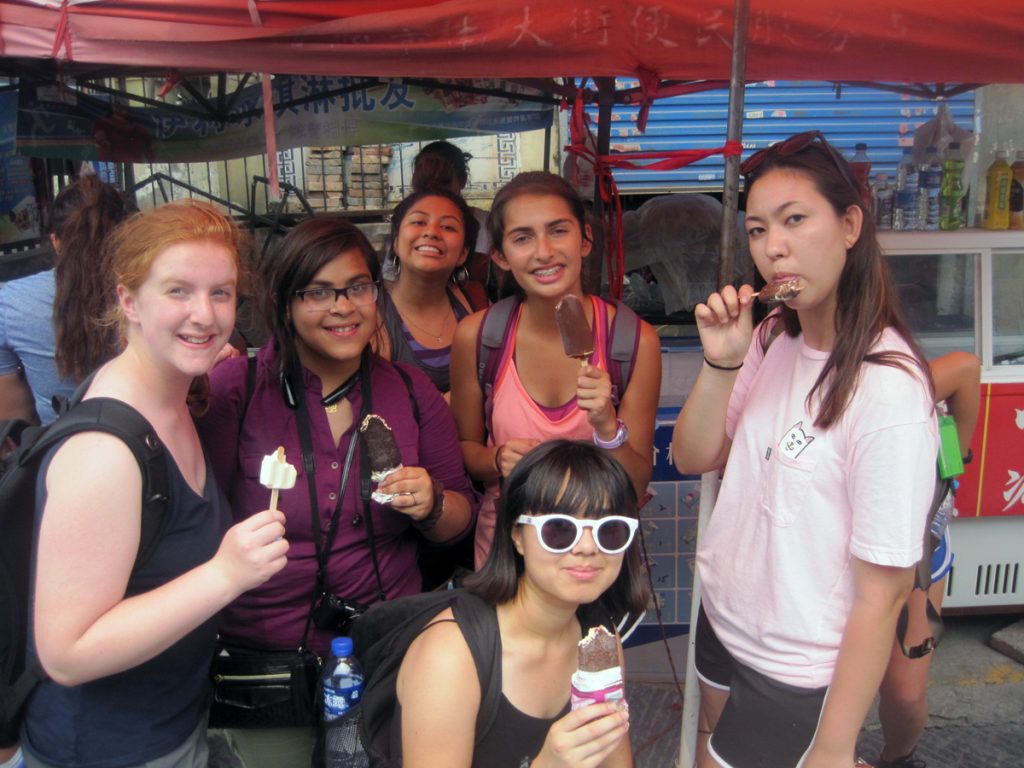
A group of Experimenters bonding over Chinese ice cream
The Group Dynamic
The first aspect that was invaluable to my ability to integrate was the dynamic of our group. At the Shanghai airport, the 11 other Experimenters and I staggered off our flight feeling exhausted and disoriented, and missing familiar faces. Sitting in the terminal waiting for our connecting flight was one of the most overwhelming moments of the trip for me — I had never felt so out of place. But our Experiment group leaders were prepared. They whipped out index cards and ushered us into a compact circle. It was there, amid the sea of curious onlookers, that our group began to form. We learned how to count off — in Chinese, of course — each receiving our own number in the group. The leaders made it clear that they were there to look after us, and despite the fact that we had all just met the day before, we could feel ourselves beginning to grow comfortable with one another.
From there, we only grew closer. On our first day in China, our group of 12 Experimenters forged our “group constitution,” written goals and guidelines for us to follow throughout the next month. Early on, we were able to share our values and work together to establish our group dynamic. It may only have been a sheet of paper, but we all understood that our constitution was something to be taken seriously. We wrote guidelines about being open-minded, actively reaching out to others, being inclusive, being positive and enthusiastic, not judging one another, and being trustworthy and honest.
The Experiment limits each trip to 10 or 15 Experimenters, which gave me the opportunity to become close with each and every one. We were given lots of freedom to roam and explore our surroundings, but always had to travel in a group of at least three people. This was done for safety as well as social reasons. For the entirety of the trip, no exclusive relationships were formed: no couples, no cliques and no exclusive friendships. Obviously, some members of the group were closer than others, but we all worked to actively reach out and connect with each other. When we went sightseeing in groups, our leaders would place us with people we didn’t know as well. Not only that, but each and every day ended with all of us crammed in someone’s hotel room, chatting, braiding hair, playing games or watching movies. It wasn’t until the end of our trip that we realized how much we had all grown to depend on each other and how much confidence we inspired in each other. The group culture provided me with a solid base —a safety net — that inspired me to reach out into the unknown culture around me.
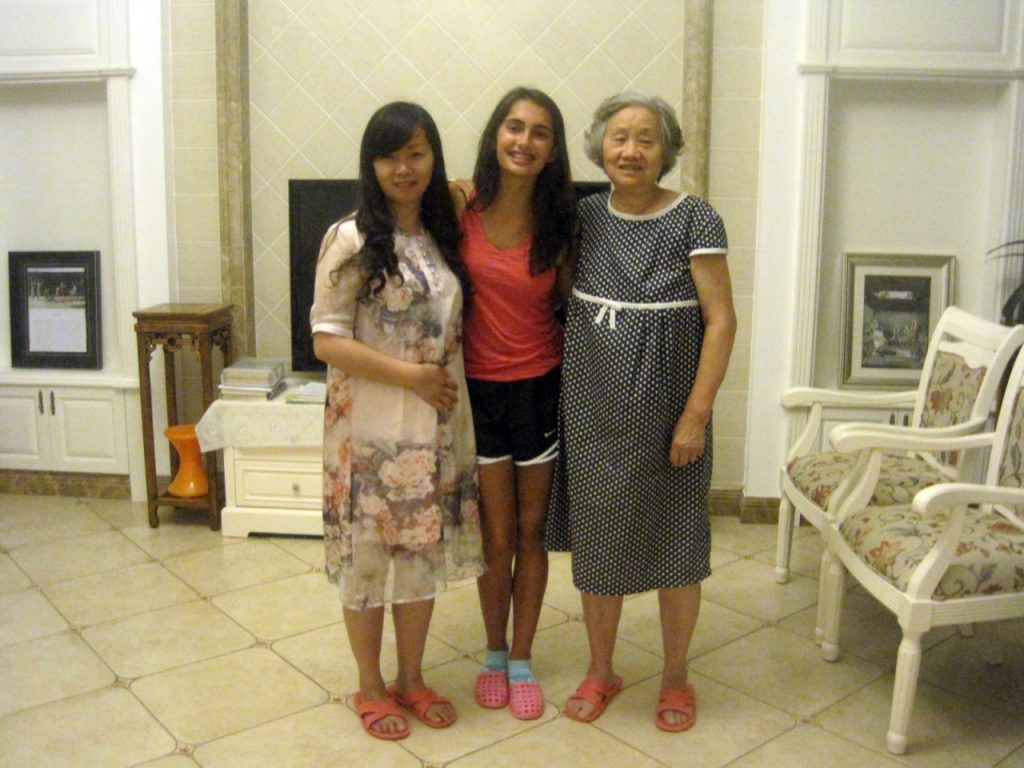
Maya with her host mom, Ayi, and host grandmother, Waipo, on her final night living with them
Homestay Orientation
After our first week in China, we Experimenters had settled into a type of routine. By the end of only the first week, we felt comfortable in China. But when you travel with The Experiment in International Living, feeling comfortable never lasts long. The Experiment believes that participants should always be pushing themselves out of their comfort zones and trying new things. If you feel comfortable after only a week in a foreign country, it’s time to push yourself. And so began my homestay experience …
The previous night, our whole group gathered together for homestay orientation. Before we even sat down, our leaders announced an activity. They had us pair off and then gave us all a word. We had to discuss with our partner what that word meant to us. We continued throughout the activity, switching partners for every topic. The topics started out relatively simple — home, parents, friends, messages, food, etc. — but soon delved much deeper. We talked about our thoughts surrounding the words Muslim, Black, White, Chinese, gay, lesbian, etc. The activity revealed the startling amount of prejudice and bias that we all hold toward certain groups and words, and also highlighted the differences in our lives back in the States.
After the activity, we looked at different possible homestay scenarios and discussed the best method for dealing with each. The leaders made sure we had their phone numbers and were well-equipped with certain Chinese phrases, know-how and simple culture rules. But my biggest tool going into homestay was the knowledge that the activity had given me: that every culture has different values, and that the way we perceive other cultures is almost always warped by our society’s biases and preconceptions. As described in my previous blog, throughout my trip, my biases and preconceptions about the Chinese culture were constantly challenged. The orientation highlighted the preconceptions and stereotypes that we all harbor about other cultures and ourselves and gave me the confidence needed going into homestay.
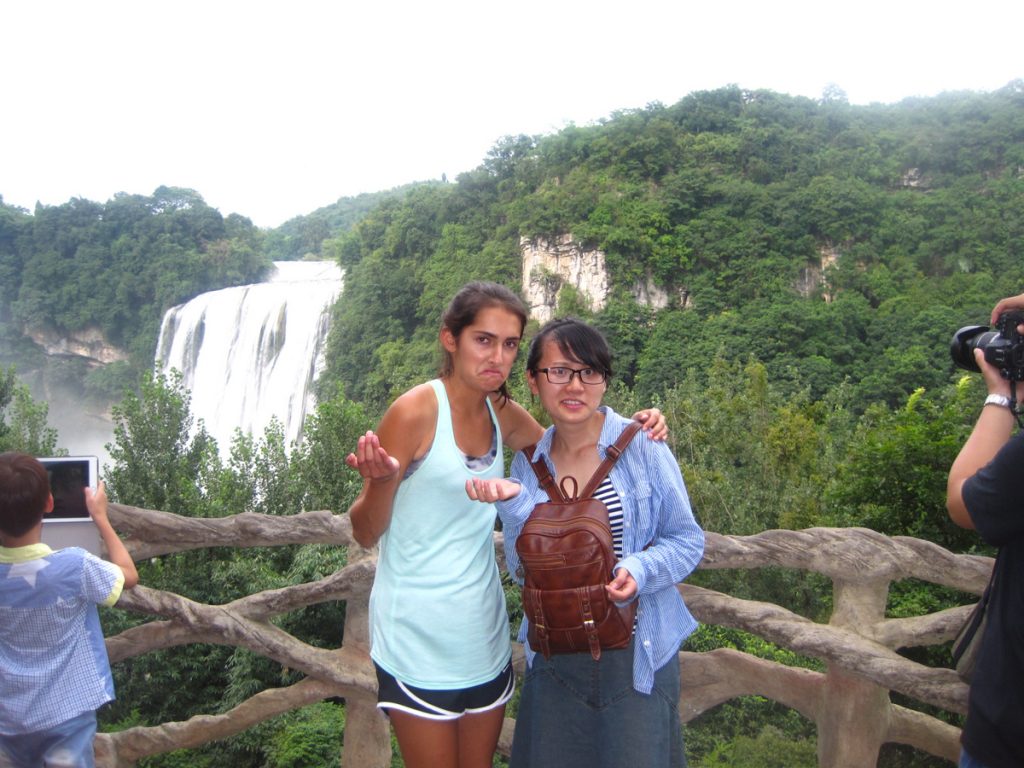
Maya and her host sister hiked to the summit of Huangjin Pubu Waterfall as one of their daily homestay group activities.
Urban Homestay
My homestay experience was by far the most profound and impactful of the whole trip. For the first time, I was completely immersed in the Chinese culture — one of the most terrifying and exhilarating experiences of my life. Because my leaders had pushed me to use Mandarin throughout the week prior to homestay, I felt confident enough to try communicating with my family. My host sister wanted to practice only English with me, but I had specific learning goals set for my Mandarin and wanted to practice. So my first homestay challenge was figuring out a compromise. This was actually a scenario that had been modeled in our orientation, so I knew what to do. My sister and I worked out a system: mornings we would speak English, afternoons we would speak Mandarin.
When I was at home with my host family, it was up to us to come up with activities to do together. But The Experiment left little time for idleness. Jackie, our young and spirited in-country tour guide, provided us Experimenters and our host siblings with engaging daily activities. This added a whole new level of immersion, as we were no longer doing activities as Americans, but as Chinese teenagers would. On the first day, my host sister and I picked tea together. The next day we explored the streets of a local ancient town. Our leaders devised challenges within the activities to help bond us with our siblings. One day, we were let loose in a street market, tasked with the challenge of finding and taking photos of a list of objects. The tasks required the Americans to speak Chinese and the Chinese students to help us. With our siblings by our side, we felt as if we were finally insiders on the Chinese way of life.
My most memorable and immersive moments of the trip occurred when I was alone with my host family. On our last day in urban homestay, our leaders ended the group activity early, giving us the opportunity to spend free time with our host siblings. Sibling pairs went to waterparks, out to lunch, to cook dinner, to explore and more. My sister and I went out to a hot pot lunch and I got the chance to try pig brain! After lunch we walked around the city of Guiyang, browsing shops, nibbling on street foods, hopping on buses and even going out to the movies. It was then, holding hands with my sister and running down the street giggling in Chinese, that I felt a total and complete sense of belonging in China. As we waited at the bus stop, heads turned to stare, as always, at the one commuter who was not Chinese. But for the first time, I stared right back at the curious onlookers and told them (in perfect Chinese), “Don’t look at me! I’m a Chinese person!” My sister and I dissolved into laughter. Free time to explore the city together was a truly priceless gift, and one of the most immersive experiences of the trip.
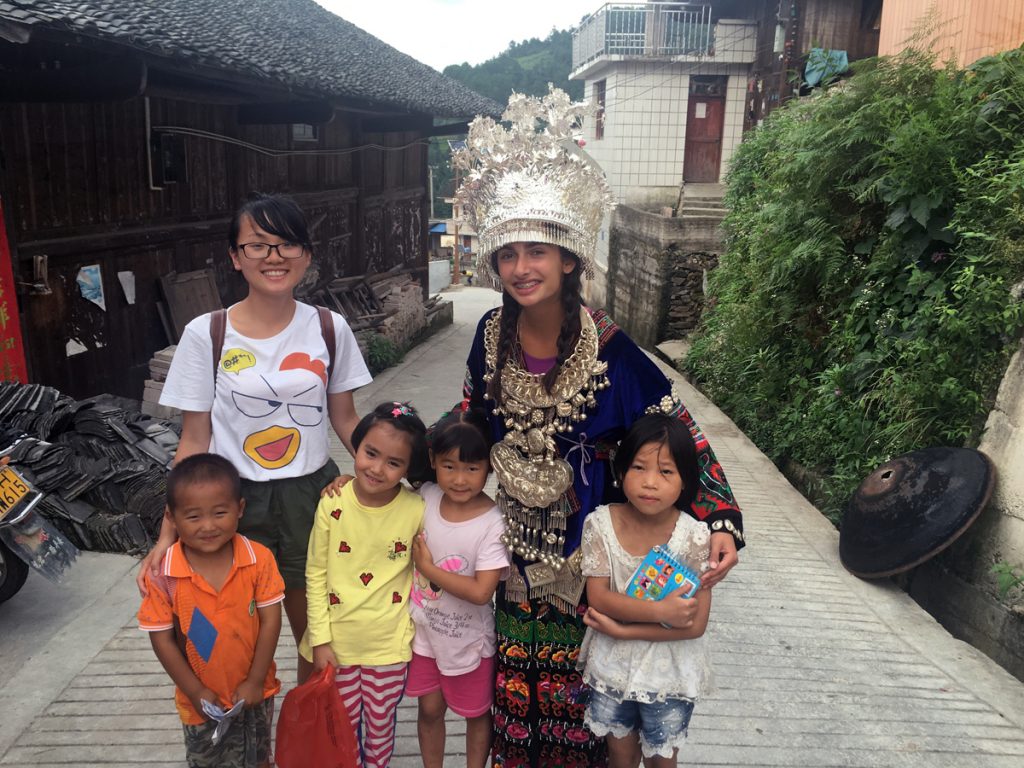
Maya (in traditional Miao clothing) with village children during her rural homestay
Rural Homestay
Just when I had began to consider myself an honorary Chinese, The Experiment, as always, turned things upside down and challenged me to rethink myself, my culture and what I thought I knew about China as a whole.
After tearful goodbyes to our urban host families, all the Experimenters and our host siblings traveled by bus to rural homestay, trading the bustling streets of Guiyang for the rugged green peaks of the Guizhou province. We were nervous, but our urban homestay had instilled in us a new sense of confidence. And having our host siblings there with us gave an added sense of security. The night before leaving, we were told the basics of what to expect: no showers, a new language, rugged living conditions, etc. But we were also given an additional orientation on the bus ride there. We learned about the background and culture of the Miao people, an ethnic minority that live in the mountains of the Guizhou province. Although the Miao are technically Chinese, their lifestyle could not be more different. They have their own language, of which we learned the basics on the bus ride, and their own history and customs. The crazy thing was that The Experiment turned what could have been a simple history lesson into an engaging preparatory session. Before we even arrived at the village, I felt prepared.
During our stay in the village, my host sister and I lived with a local farmer. We were both complete strangers to the Miao culture and used each other for support. Immersion came slowly for everyone, but was helped along by the structure of our rural itinerary. Our whole group would eat breakfast together in the chief’s house. We would then head off to our daily activity, which was normally outside of the village, and return home for dinner, which we ate in the chief’s house as well. At night, we would all hang out at the village’s school. We played basketball with local kids, had dance parties and stargazed.
On the last night, the villagers cooked us a giant feast, which the local Miao people, the urban Chinese and the Americans all enjoyed together. Our conversations were a mash of three different languages, and the group was an epic conglomeration of countless cultures, but our intent was all the same: to build connections and to understand one another. After our feast, we had a giant bonfire at the school’s basketball court. All of the village children came to play with us. We ran around, played games and sang songs with them. That night was magical. Dancing under the stars and playing games by the light of the bonfire, it didn’t matter what language anyone was speaking — we all felt as one.
Mandarin Challenge
My group leaders immediately recognized my prior experience with Mandarin and continually pushed me to set learning goals throughout the trip. In the Shanghai airport, they asked me to use my Mandarin to find out where the security check was. That was a huge moment for me. After I realized that I could successfully communicate with the Chinese people, my outlook on the trip totally changed. Because of this, I found myself already feeling more comfortable in China on only my first day.
As the trip progressed, my confidence and experience with Mandarin grew exponentially. In my periodic check-in meetings with the leaders, we discussed different ways to push my Mandarin to the next level. My leaders were both fluent in the language, so they went out of their way to speak to me using only Mandarin. Not only that, but when a Chinese interpreter was needed, they would allow me to speak for the group.
The program had a focus on cultural immersion, and with it came an element of language learning. On our first week we were divided into groups based on skill level and given an hour of Mandarin class. The class was extremely helpful for those who had never been exposed to Mandarin, but all of my growth in this area was a result of learning how to be a proactive language learner.
Halfway through the trip, our leaders issued the Zhongguo Tong Challenge: to speak only Mandarin for 24 hours straight. I was the first of the group to accept and complete the challenge, but not the only one. Everyone was encouraged to try, and in the end, almost half of our group had done it. On my trip, I not only learned how to become a student of my environment, but I also learned how to become the teacher. As an advanced Mandarin learner, the leaders helped me to teach my groupmates the basics. I spent many a bus ride writing out tones and characters for my fellow Experimenters. Through my countless conversations and experiences using Mandarin, I was able to take my immersion to the next level, connecting not only with the language but with the culture as well.
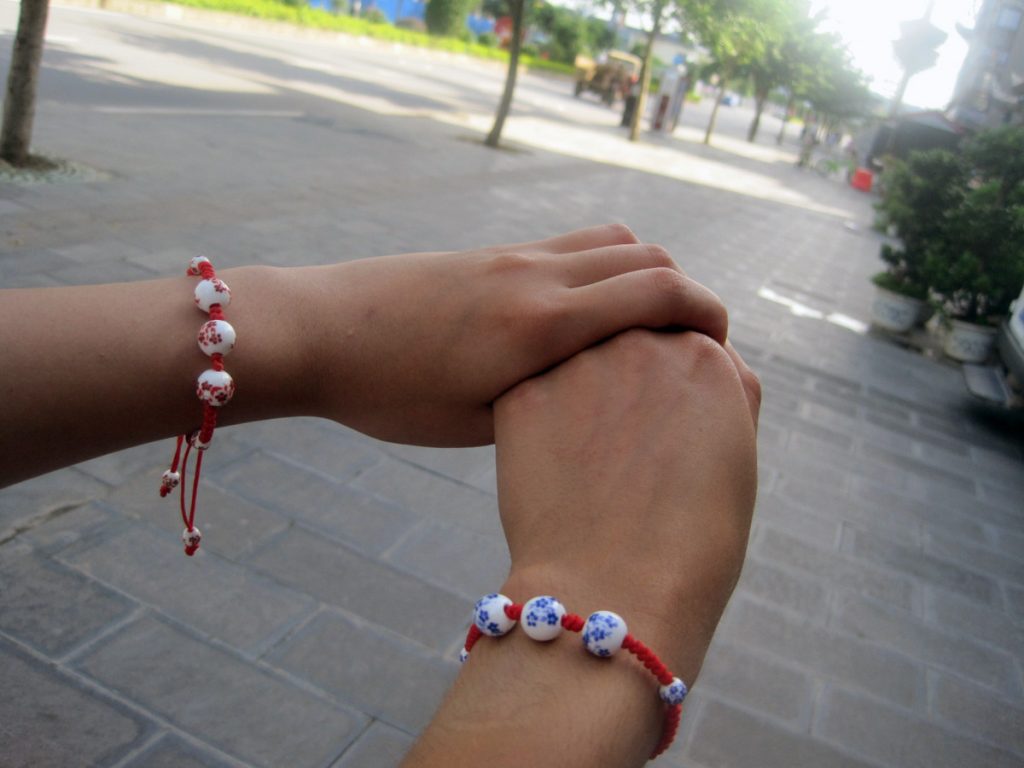
Maya and her host sister bought matching “sister bracelets” on their last day together, and still wear them even now
Lasting Change
My summer in China left an indelible mark on my values and the way I view others. Not only did The Experiment teach me how to integrate into a new culture, it taught me how to reexamine my own. In immersing myself into the Chinese culture, I was able to see things from the Chinese people’s point of view. While this may sound cliche, I consider this new perspective that I gained over the summer to be priceless.
My two weeks of homestay taught me that human connection is possible no matter what the barriers. My group leaders provided me with the confidence needed not only to complete homestay, but to thrive in it. Because of the confidence I felt with my Experiment group, I was able to reach out and connect with my host family on a deeper level. Throughout the entire trip, I was always supported. I will never lose the new perspective and understanding that I gained from my month abroad, and the indelible feeling of belonging in a new culture will stay with me forever.
If you are interested in exploring more firsthand high school summer abroad experiences from The Experiment in International Living, follow them on Instagram on @ExperimentAbroad, on Facebook at https://www.facebook.com/experimentabroad, and on Twitter via @EILSummerAbroad. Their hashtag is #ExperimentAbroad.


